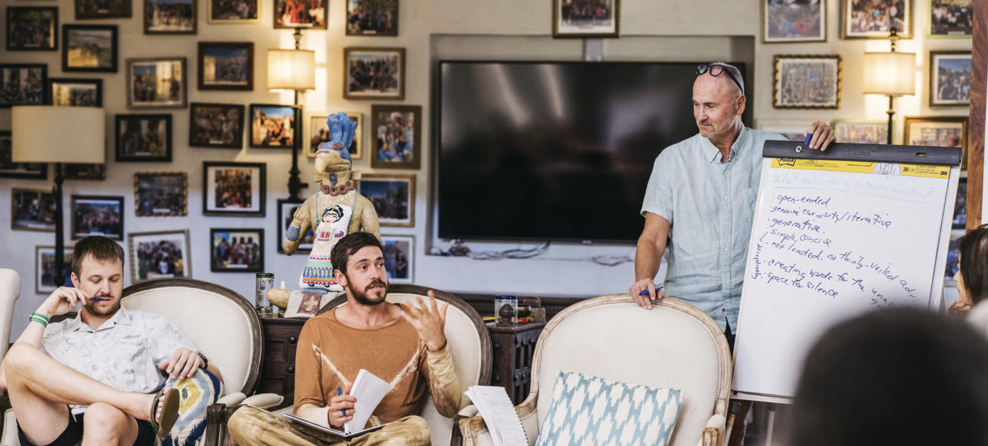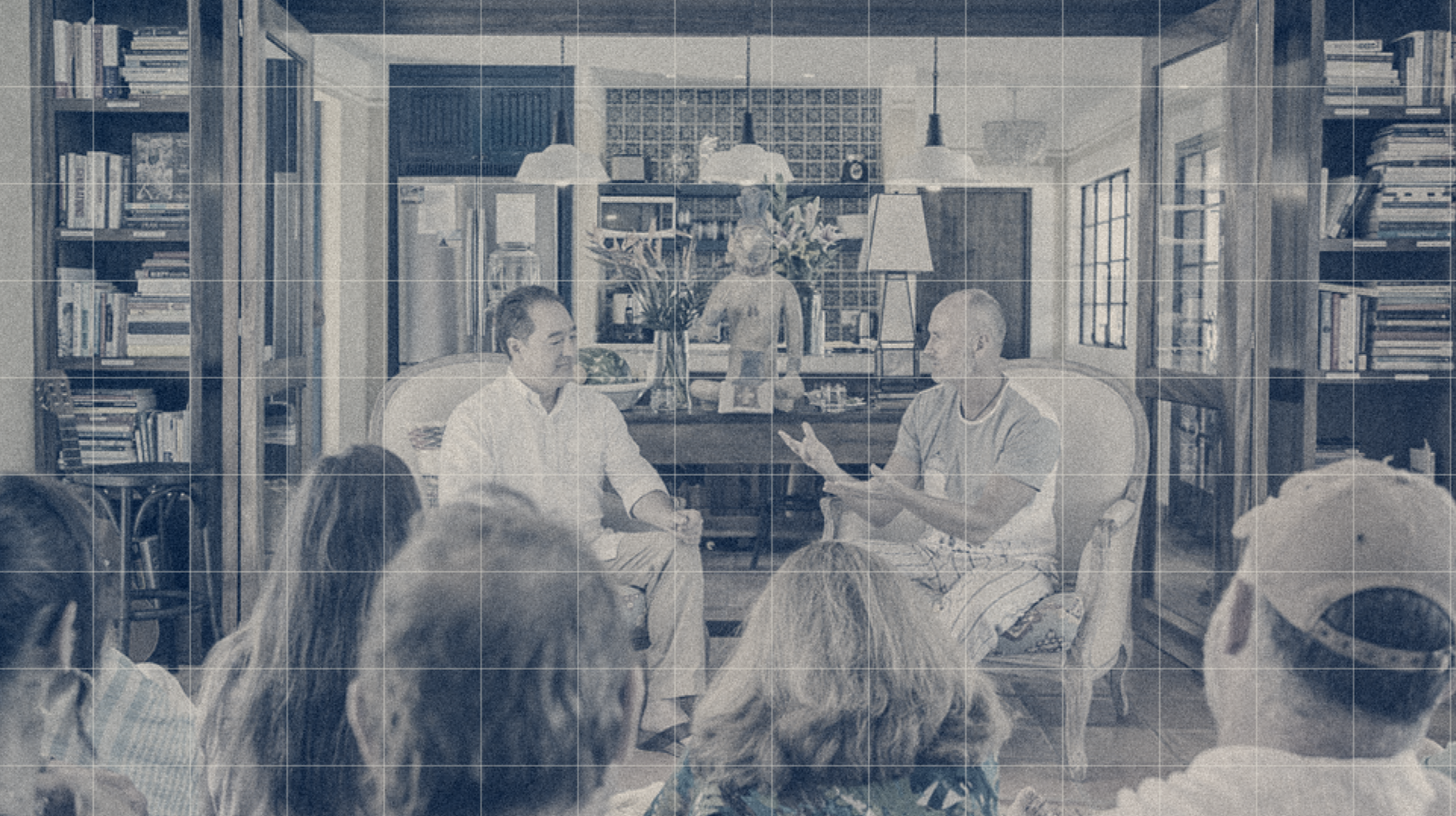Case Study Eight
Chip Conley's Modern Elder Capstone
“The purpose of life is to discover your gift, the work of life is to develop it and the meaning of life is to give it away.” —David Viscott
Chip Conley adapted this for his Capstone:
“The purpose of life is to discover your wisdom, the work is to develop it, and the meaning is to give it away.”
This reframe sits beautifully within the classical Capstone order or arc of life:
Cornerstone is to discover. Keystone is to develop. Capstone is to give it away.
Or more directly: The purpose of being a modern elder is to discover your Capstone, the work is to develop it, the meaning is to give it away.
INTRODUCTION
Chip Conley made his name bringing joy to others… literally. As the founder and CEO of Joie de Vivre, he created the second-largest boutique hotel brand in the United States, rooted in the belief that hospitality was more than a transaction. After 24 years in charge, he sold the company and stepped into a liminal state, what we’d call the bardo in Capstone terms.
It was then that the founders of a little-known start-up approached him for guidance. Their idea? To disrupt hospitality. Their name? Airbnb.
Chip’s role there would prove transformational for both parties. His immersion in tech culture while mentoring its youthful founders catalysed a new personal philosophy: a modern elder is someone as curious as they are wise, both teacher and student. That idea, fittingly born in the bardo, would become his Capstone: the Modern Elder Academy (MEA), the world’s first midlife wisdom school.
CORNERSTONE
Chip was born in 1960 in Long Beach, California. As a boy, he dreamed of being a writer. But when he shared that dream with his father at age twelve, he was met not with encouragement but a threat of sending him to therapy. The sting of that moment would put his creative ambition on hold.
He earned his BA and MBA from Stanford, graduating in 1984. Among his classmates: Seth Godin, with whom he would regularly brainstorm ideas. Chip was drawn to the idea of entrepreneurship, not just for independence, but as a creative act. His father’s dissatisfaction with corporate life made him determined to forge a different path.
Therapy in early adulthood was pivotal. It opened his eyes to human psychology and its profound absence in traditional business thinking. Why weren’t leaders trained in inspiration, emotion, and meaning? He realised then: all companies are made of people. Why not design them accordingly?
His first job, at a renegade real estate firm in San Francisco, taught him the commercial ropes. Within a few years, he bought and transformed an inner-city motel. Joie de Vivre was born, a brand and business devoted to human happiness.

KEYSTONE
The keystone chapter of Chip’s life was the rise of Joie de Vivre. But fifteen years in, he found himself drawn to Abraham Maslow and his famed hierarchy of needs. Chip applied the pyramid not just to himself, but to his entire organisation. He called his adaptation the Peak Model, with three tiers:
Survive – Meet basic needs; earn to cover life’s essentials.
Succeed – Enable personal growth; build careers, not just jobs.
Transform – Inspire; understand the customer better than they know themselves and deliver joy with soul.
This purpose-led model saw the business triple in size between 2001 and 2006. Chip captured the insights in his bestselling book Peak: How Great Companies Get Their Mojo from Maslow. He rediscovered his early love for writing and began speaking more widely.
But life had other plans. In 2008, during a difficult period marked by the suicide of six close friends and the end of a long-term relationship, Chip broke his ankle. The resulting infection spread, and while on stage at a conference, he had an allergic reaction to medication. He collapsed. His heart stopped. He flatlined.
He later described it as a divine intervention. In the Capstones book we call it a life jolt.
It was a moment of existential reckoning. He revisited Man’s Search for Meaning by Viktor Frankl, and slowly, the path ahead began to reveal itself. He decided to sell Joie de Vivre. He was fifty and, once again, back in the bardo.
As Chip later reflected:
“Maybe this is the time when we begin to evaluate our lives less in terms of social competition and more in terms of social connectedness.”
In 2012, Airbnb came knocking. Its founder Brian Chesky was seeking to democratise hospitality, a mission that struck a deep chord with Chip.
He joined as Head of Global Hospitality and Strategy. At 52, he was twice the age of most employees. One co-founder called him a “modern elder”, not an authority figure stuck in their ways, but a curious collaborator. That label stuck, and so did the insight it revealed.
“Over time I learned I wasn’t at Airbnb to dispense factual knowledge, I realised the wisdom I had, understanding humans as leaders, emotional intelligence, helping create an environment to teach leadership, culture, brand, building an incentivised system for human motivation was where I was providing value. Whilst I was learning DQ (digital intelligence) from those younger than me, they may have learned a little EQ (emotional intelligence) from me.”
CAPSTONE
His experience of flatlining, selling Joie de Vivre and Airbnb led to a deeper calling: the founding of the Modern Elder Academy in Baja California Sur in 2018. Nestled on a beachside property, MEA is a wisdom school dedicated to helping people navigate midlife. The boutique resort is spread over three beautiful acres, backing onto a beach. Chip also has a home on the property. It offers week-long immersive programs focused on identity, purpose, mindset, and transformation. Graduates leave with a certificate in “Mindset Management” and, more importantly, a renewed sense of direction.
“In 1965, the term midlife crisis emerged. At that time, midlife was perceived as 45 to 65 or 40 to 60. Today, I think midlife is anything in between approximately 35 to 75 because people are going to work longer, and people start feeling irrelevant earlier” says Chip.
In this window, we’re required to remake ourselves repeatedly—just as he did. With three generations and above now co-existing in the workforce, the need for intergenerational collaboration has never been greater. And wisdom has never been more in demand.
His Capstone is two-fold:
To help individuals repurpose themselves and mine their mastery, making them relevant for the second half of life.
To shift workplace mindsets, recognising that modern elders offer not just tenure but relevance, emotional intelligence, and perspective.
Chip envisions a future of regenerative, intergenerational communities—not retirement villages but purpose-driven campuses where midlife growth is normalised, supported, and celebrated.
~ Emotional Intelligence, Wisdom & Capstones ~
Chip follows the same mindset as Jim Mellon mentioned in our book about retirement:
“The three-stage life of the past—learn until 25, earn until 65, retire until death—is evaporating” says Chip.
Chip’s Capstone is challenging outdated hierarchies:
“The physics of wisdom doesn’t flow just from old to young anymore.”
“We get better at collaboration with age. Emotional intelligence becomes our superpower.”
~ Chip As A Catalyst ~
This is a man who has found his flame. His two Capstone-phase books: Emotional Equations and Wisdom at Work: The Making of a Modern Elder, cement his voice in this new chapter.
His beachside academy is not just a campus. It’s a proof-of-concept for a new kind of midlife. He is in conversation with the likes of Canyon Ranch and Hyatt about adapting the model for their audiences. And he remains curious, always evolving.
His insight rings especially true in today’s business world:
“The most neglected fact in business is that we’re all human.”
SUMMARY
With the Modern Elder Academy, Chip has created a new blueprint for life after fifty, one not defined by decline, but by renewal.
“What I’m doing more of is thinking of myself as a catalyst—and MEA as a role model. I’m less focused on putting dots on the map and more focused on changing the map entirely.”
We wholeheartedly agree… wisdom isn’t taught it’s shared.


